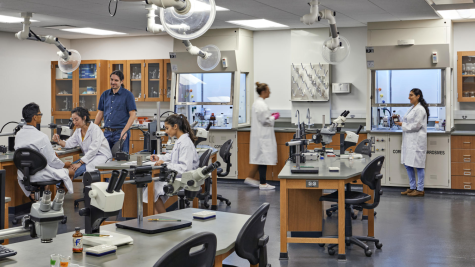Is different always better?: Exploring iSchool’s commodities through the work ethic of its students
As you sit in class, mindlessly and unconnectedly sitting through the lessons of a teacher whom you are unfamiliar with, your mind begins to wander. Material loses its meaning, and it becomes harder and harder to focus.
The high school experience becomes a blur, and you solely enjoy time with friends or alone.
This is a common narrative for many high school students today. Its routine influences the ways in which students perform academically.
Thankfully, at the NYC iSchool, this disconnect is not prevalent due to the many unorthodox commodities that the school has to offer.
Amongst many other things, iSchool offers a series of intensive module courses that cover a broad range of real-world concepts and issues, uses a mastery-based grading system, and, most importantly, builds secure, long-lasting relationships between its students and its staff.
“One of the things I love about [iSchool] is that we’re not interested in students learning how to study for a test,” recognizes 10-year guidance counselor and advisor Ms. Colon. She believes that “in their adult life, [students are] not going to use that.” At iSchool, she continues, she “like[s] the fact that you have to work with other people, and that can be challenging, but that is something that will happen in [students’] potential career[s]. It encourages [them] to think about how [they] would navigate that.”
While many classes at the iSchool acknowledgedly present the opportunity to work in groups, there are some asynchronous and online courses that students use to independently navigate through learning.
The iSchool offers online content for select language courses and Regents-based classes, such as Italian, Mandarin, US History, and Living Environment. The efficiency of these online courses align with the ways in which iSchool makes use of its resources.
For language courses, Ms. Colon says, “[iSchool] only [has] 2 full-time Spanish teachers, and so, to give students more of an option, [iSchool] offer[s] Rosetta Stone.”

As for Regents courses, she continues, “we don’t have a say in teaching them because we are a New York State school that requires students to do the five regents. It really just makes sense to have part of [the class’ course] online, since it is a lot of memorization and regurgitation. You don’t necessarily need a teacher in front of you at all times for that.”
This independence, though, can have an influence on the productivity and focus of students.
According to a Higher Education Quality Council (HEQCO) study, it was determined that “students in online courses are more likely to receive lower grades in comparison to students in face-to-face courses. The persistence rate of students in online courses (91.19%) is lower than the persistence rate of students in face-to-face courses (94.45%).
NYC iSchool senior Sara Hossein recounts this lack of persistence over the past two years.
Sara has taken 3 predominantly asynchronous courses, in addition to taking half of her sophomore year and the entirety of her junior year online amidst the COVID-19 pandemic. She has taken both core and elective classes through this form of learning.
“Taking AP Calculus [online] in junior year was difficult because I wasn’t getting the full experience learning the material. Online classes lack the physical approach to teaching and learning, which is really important in my opinion,” recounts Sara.
This same notion of learning can apply to Sara’s freshman year when taking iSchool’s asynchronous classes while in the school building.
Sara states that “Living Environment and US History were hard, especially hard during second and third quarters. A big reason for this was because [she] was entering [iSchool] as a freshman and had to learn to teach [herself] the material.”
The grades students receive while adjusting to iSchool’s approach to learning are not necessarily negatively impacted. Students are in luck due to the way iSchool grades material: the mastery system.
The mastery grading system is the school’s approach to learning and understanding information in a more comprehensive way. The Mastery system prioritizes the ways in which students showcase their understanding of information as opposed to the memorization of that information.
“iSchool doesn’t emphasize taking a test just to forget the material after it’s taken. We don’t operate like that as a school because we don’t believe test-taking should be the number-one priority,” says Ms. Colon.
Not prioritizing comprehensive curricula has proven to have a number of consequences for students nationwide.
As stated by a University of Texas news article, negative ramifications of test-taking can include “the loss of valuable opportunities to learn due to testing preparation, the narrowing of curriculum to focus on testing, and the stigmatization of students and schools as failing or in need of intervention based on test scores.”

The benefits of iSchool’s grading system stem further than just the deprioritization of testing. They also align with iSchool’s belief in student choice and freedom.
One way this belief is demonstrated is through the ability to retake particular assignments.
“I really like the fact that, with the mastery grading system, we’re able to retake exams and demonstrate that we’ve corrected our mistakes and now better understand the material,” continues Sara.
While juggling college and scholarship applications alongside schoolwork, Hossein believes the mastery system also “makes it a lot easier to prioritize what assignments [she] need[s] to get done because productivity assignments aren’t worth anything.”
Since productivity assignments are not factored into students’ averages in any course, Sara believes the system has “made it a lot better for [her] to demonstrate and understand the material without having to worry about being harshly graded on other assignments.”
Additionally, the student body at iSchool can choose which classes to take quarter after quarter.
With a number of required core classes, students tend to receive the most opportunity when choosing their modules.
Module, or “challenge-based learning,” is a nine-week course “developed around real-world challenges. Modules are designed to develop students’ understanding of big ideas and broad global concepts, and their development and application of 21st-century skills.”
As real-world challenges constantly evolve, module topics must change, too.
“There will be some repetitive modules,” says Ms. Colon, but “[students are] going to see new courses all the time, because teachers are thinking about what’s meaningful content. Teachers choose [modules] based on their expertise” and “what they think our students would benefit from.”
Students at iSchool carefully select which topics they’d like to learn about through many different lenses.
NYC iSchool sophomore Maa Feaster chooses his module topics “based on the credits [he] need[s]. That’s why [he] like[s] iSchool’s ‘Course Descriptions’ emails: they tell [him] the credits [he] can get through fun classes. [The modules] just make the subject sound more appealing.”
The benefits of choosing modules that appeal to students, both through their credit needs and interests, stem further than their lives in high school.
Currently in the Bash the Trash module, Maa observes that “Bash the Trash made [him] think more about a career path with music because music interests [him].” He’s glad to be able to “think about music more in school, instead of having to do it in [his] own time.”
He acknowledges, “music is a hard thing to learn. At least at iSchool, with Mastery, I don’t have to worry about not being good at it at the beginning of the quarter or worry about my grades being low. I know that I have time to get better at it, and my grades will show that.”
Both iSchool’s modules and its mastery system are able to simultaneously highlight the value in progress, as opposed to the destination.
First-year iSchool science teacher Mr. Yassin reflects on his students’ progress throughout the year, and the ways in which they have made progress: “Many of iSchool’s courses are something that are continually improving and circled back to. Oftentimes, in a regular system of grading, it’s just looking at the grade and forgetting about it after. It’s more of a fixed mindset, where you see the grade and measure your self-worth, your competence. It’s hard to do that with modules in iSchool, because they are such continuous courses.”
Continuously revisiting certain topics through the mastery system and module’s approach to learning has proven to help students retain information better.
According to a Learning Liftoff article, “students forget about 56% of what they learn within one hour, 66% within one day, and 75% within six days.”
Thus, offering iSchool students the opportunity to continuously revise assignments over a broad range of topics gives them the opportunity to comprehend information better. This also encourages students to take difficult classes, because the comprehension of information is coherent.
Sara recounts a difficult module offered in the 2021-2022 school year: “At the beginning of this year, Mind Control became a new module and I had just realized I wanted to explore neuroscience in college. Neuroscience is a hard major to study, so I figured the class would be, too,” Sara acknowledges, but “[she] knew focusing on the masteries of the class instead of the productivity would give [her] a sense of what neuroscience would really be like in college.”

She adds that “masteries are something you can always redo if you need to, so you’re sort of restudying the material in a way if you ever need to retake something. [She] think[s] that can help you remember stuff more easily, too.”
While Sara considers how information is being presented when choosing her modules and classes, she also considers the teachers.
“I definitely enjoy the class more if it’s with a teacher that has a teaching style that I prefer,” says Sara.
Teaching styles can often have an influence on the bonds between teachers and students, as well as how students operate in the classroom.
According to an American Psychological Association (APA) article, “classroom environments that are more conducive to learning and meeting students’ developmental, emotional and academic needs foster positive relationships between teachers and students.”
These positive relationships indirectly encourage students to perform better within a school setting.
When recounting on her experience in her classes with her teachers with whom she had formed meaningful bonds with, 4-year iSchool student Sydney Johnson states that “[she’s] had multiple advisors at iSchool; in fact, [she’s] had a total of 4. [She] think[s] [she] became fairly close to each of the advisors that [she’s] had, and [she] see[s] Ms. Colon for counseling, so [she’d] say [they] have a close student-teacher bond. Ms. Colon helps [her] in a lot of ways, and [she] think[s] that can be shown through the relationships [she] form[s] with other people.”
These bonds with teachers can improve social standing as well as academics.
iSchool sophomore Talia Cole recounts the bonds she shares with her subject teachers, stating that “[she] look[s] forward to some of [her] classes because [she] actually like[s] the teacher, and that encourages [her] to get [her] work done. [She] want[s] to do well for those teachers.”
On the other end of these relationships, teachers understand the importance of having personal connections with their students.
Mr. Yassin emphasizes the fact that, in classes, “it’s not just about the content and the subject; this has to include a bond with the teacher. Without it, there’s no life to the subject.” He thinks that the “teacher plays a huge part in making the students feel like they want to achieve well, and that influence goes a long way.”
Teachers allow students to perform better because they want to maintain relationships with their teachers, but students often do not realize the benefits they are reaping solely for themselves.
In reality, Ms. Colon concludes, “students aren’t performing for the teacher. They may not realize it, but they’re helping themselves. Whether it’s their teacher or advisor, there is someone students need to feel that they can trust. If a student believes that a teacher believes in them, is invested in them and isn’t wasting their time, that mutual respect is there, and they’re going to want to perform. They do it for themselves and that cycle repeats.”







